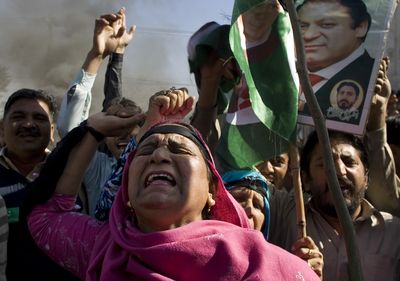Pakistan court bans popular politician
Ex-prime minister barred from office; showdown expected

ISLAMABAD, Pakistan – Former Prime Minister Nawaz Sharif may well be the most popular politician in Pakistan. So the Supreme Court’s decision Wednesday that bans him from holding elective office has set the stage for what could be a bitter showdown between his backers and the already shaky government of President Asif Ali Zardari.
Pakistan, which over the past 18 months has seen a grass-roots uprising against longtime military leader Pervez Musharraf, the assassination of former Prime Minister Benazir Bhutto and the advent of civilian rule, appears ill-prepared for another prolonged period of political turmoil. Islamic insurgents are gaining strength, and the economy is virtually on life support from international lenders.
Analysts characterized Wednesday’s court ruling as a drawing of battle lines between Zardari’s Pakistan People’s Party and its one-time ally, Sharif’s Pakistan Muslim League-N. The two parties teamed in February 2008 to take on Musharraf, soundly defeating his party in parliamentary elections and ousting him from office six months later. But having gained power, they fell out with one another.
Sharif’s supporters protested Wednesday’s verdict, saying they do not recognize the legitimacy of the court. They repeated demands for the reinstatement of the former chief justice and other senior judges dismissed by Musharraf in late 2007 during a bout of de facto martial law.
“This is a mockery of justice, a mockery of democracy,” Ahsan Iqbal, a senior leader of Sharif’s party, said of the ruling. “This decision has once again pushed Pakistan on the path of political confrontation and political instability.”
The former prime minister’s brother, Shahbaz Sharif, was also disqualified by the court from holding office, in effect removing him from his position as chief minister of Punjab, the country’s most populous and affluent province.
Supporters of the Sharifs poured into the streets of major cities, burning tires and chanting anti-government slogans.
A firebrand populist, Sharif returned to Pakistan in late 2007 after nearly eight years in exile, foiling efforts by Musharraf to keep him away. Although Sharif’s party trailed the Pakistan People’s Party in the February 2008 vote, some commentators attributed that to sympathy over the assassination six weeks earlier of Bhutto, Zardari’s wife. Most public opinion polls suggest Sharif’s popularity has now eclipsed Zardari’s.